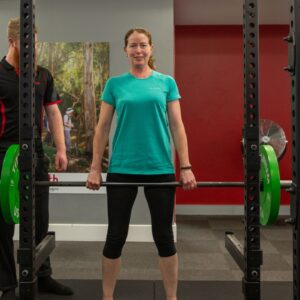Doing things you didn’t think possible – Strength training at 84
About a year ago, on the 3rd June 2022, Con started working on his strength with us at the age of 83. Despite his age, he was still actively working every day, but was finding that his body wasn’t keeping up with what his mind wanted to do. He had back pain, knee pain, shoulder pain. He thought the only option to improve his mobility was an “operation” on his knee, although he wasn’t sure which “operation” he needed on his knee.
His youngest son, Alex (who had been a previous client our ours) flew back from Los Angeles to spend a few months with his dad and get him started on improving his mobility again. One of his first steps was to ensure that Con started regular strength work, under a supervised training program with us.
Despite his initial resistance and the occasional breaks in routine because ”work was too busy”, Con has remained relatively regular with his program. Con is currently 84 and can proudly bench press 40kg and deadlift up to 60kg. (These are his favourite exercises because it shows everyone how strong he is).
He remains very active in his property business and although his knees and back occasionally flare up (usually due to overdoing it at work on a particular project), these are much more manageable and no longer restrictive in his life.
So why is strength training so important, especially as you age beyond the age of 60?
The loss of strength from age is much less the loss of strength from lack of strength training
Regular strength training, done twice a week, particularly in a guided, structured way can prevent and reverse the loss of muscle mass with age.
Muscle mass naturally declines with age (about 3-8% per decade after the age of 30), which accelerates after the age of 60, in a process called sarcopenia (Volpi et al 2004). This muscle loss, is why walking, one of the most popular forms of exercise, is not enough to keep us operating independently as there is not enough load to maintain and improve muscle mass (Butcher 2023).
The biggest thing that we see at our centre, is the reduced muscle strength as a result of a lack of strengthening exercises in sedentary people’s lives. Most people are just not strong enough for what they ask their bodies to do in everyday life, which means that when you go for that walk, climb up hill, do the gardening on the weekend or lift your child or grandchild, it’s just more effort than it should be and you are more likely to injury yourself. This leads to a vicious cycle, where you are not strong enough to do what you would like, you do even less, get further weaker and the effort of harder again.
The biggest actions you can take to improve your confidence and functional ability is to work on your strength and improve your dynamic balance (Butcher 2023).
Strength training has direct effects on the health of your brain
Strength training is one of the things that you can do to improve long term cognitive function and memory. People who are stronger in middle age have more grey matter in their brain and memory a decade later. The explanation may be because weight-bearing training releases Osteocalcin from the bones. This improves the size and connectivity of the hippocampus, which has a major role in memory and learning.
People with higher grip strength (a proxy for overall body strength) performed higher in memory tests and reaction time. Again, in a study, those who lifted weight at least once a week showed significant improvements in cognitive function, such as attention. It seems to be because strength training releases several chemicals into the brain, such as BDNF, which improve the health of nerves and brain cells.
In addition, strength training is linked with higher self-esteem and a feeling of being more capable in all stages of life. Our brain has an unconscious sense of health and state of our muscles and bones system, that makes us feel we “can or can’t do something”. As a result, strength training is a powerful tool against anxiety and depression. Sadly though, because of a more sedentary lifestyle, adults today are weaker than adults of the 1980’s, with further weakness in the up-coming generation.
Our strong recommendations:
Keep it simple, and make/keep the following changes to your lifestyle:
- Strength training twice a week, involving most of the major muscle groups
2 structured and focused strengthening sessions a week (30 min each), focusing on all the major muscle groups in the body is enough to strengthen your body and benefit in a better life. The great news is that these adaptive effects are beneficial at any age. Although the effects are slower after the 7th decade of life (after the age of 60), the effects of training strongly outweigh the decline due to age.
References:
Butcher L (2023) To stay healthy in old age, research finds building muscles is key. The Washington Post. 20th February 2023
Volpi E, Nazemi R, Fujita S (2004) Muscle tissue changes with aging. Curr Opin Clin Nutr Metab Carem 7(4), 405-410
Williams, C (2021) Mind-altering Moves. New Scientist, 22nd May 2021, No. 3335. P34-38.
Thomson, H. (2020). Discover your Inner Strength. New Scientist, 34-38.
Do you have any questions?
- Call us on (03) 9857 0644 or (07) 3505 1494 (Paddington)
- Email us at admin@mdhealth.com.au
- Check out our other blog posts here
Our clinical staff would be happy to have chat if you have any questions.
Take the first step to a healthier you!
Would you prefer for someone to contact you to book your FREE Full Body Assessment*?
Please fill in this form and someone from MD Health will be in touch with you soon.
Alternatively please call us on:
07 3505 1494 (Paddington – Brisbane (QLD) Clinic)
Or email us:
admin@mdhealth.com.au (VIC) paddington@mdhealth.com.au (QLD)
*Please note only the Full Body Assessment is a FREE service. The Full Body Assessment is for new clients at MD Health or returning clients who haven’t been in for 6 months or longer who intend to particpiate in our 13 Week Clinical Pilates Program**.
For all new clients who wish to come in for a one-off, casual or adhoc basis for Physiotherapy or Exercise Physiology the Initial Physiotherapy or Initial Exercise Physiology appointment is a paid service.
** The 13 Week Clinical Pilates Program at MD Health is not a lock in contract and you are not required to attend for the full 13 weeks if you do not wish.
This site is protected by reCAPTCHA and the Google Privacy Policy and Terms of Service apply.




